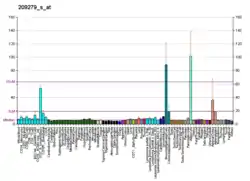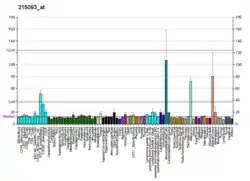NSDHL
Sterol-4-alpha-carboxylate 3-dehydrogenase, decarboxylating is an enzyme that in humans is encoded by the NSDHL gene.[5][6] This enzyme is localized in the endoplasmic reticulum and is involved in cholesterol biosynthesis.[7]
Clinical significance
Mutations in the NSDHL gene are associated with CHILD syndrome which is a X-linked dominant disorder of lipid metabolism with disturbed cholesterol biosynthesis, and typically lethal in males.[7][8]
References
- GRCh38: Ensembl release 89: ENSG00000147383 - Ensembl, May 2017
- GRCm38: Ensembl release 89: ENSMUSG00000031349 - Ensembl, May 2017
- "Human PubMed Reference:". National Center for Biotechnology Information, U.S. National Library of Medicine.
- "Mouse PubMed Reference:". National Center for Biotechnology Information, U.S. National Library of Medicine.
- Ohashi M, Mizushima N, Kabeya Y, Yoshimori T (Sep 2003). "Localization of mammalian NAD(P)H steroid dehydrogenase-like protein on lipid droplets". J Biol Chem. 278 (38): 36819–29. doi:10.1074/jbc.M301408200. PMID 12837764.
- Persson B, Kallberg Y, Bray JE, Bruford E, Dellaporta SL, Favia AD, Duarte RG, Jornvall H, Kavanagh KL, Kedishvili N, Kisiela M, Maser E, Mindnich R, Orchard S, Penning TM, Thornton JM, Adamski J, Oppermann U (Feb 2009). "The SDR (Short-Chain Dehydrogenase/Reductase and Related Enzymes) Nomenclature Initiative". Chem Biol Interact. 178 (1–3): 94–8. doi:10.1016/j.cbi.2008.10.040. PMC 2896744. PMID 19027726.
- "Entrez Gene: NSDHL NAD(P) dependent steroid dehydrogenase-like".
- Konig A, Happle R, Bornholdt D, Engel H, Grzeschik KH (Apr 2000). "Mutations in the NSDHL gene, encoding a 3beta-hydroxysteroid dehydrogenase, cause CHILD syndrome". Am J Med Genet. 90 (4): 339–46. doi:10.1002/(SICI)1096-8628(20000214)90:4<339::AID-AJMG15>3.0.CO;2-5. PMID 10710235.
Further reading
- Dawson SJ, White LA (1992). "Treatment of Haemophilus aphrophilus endocarditis with ciprofloxacin". J. Infect. 24 (3): 317–20. doi:10.1016/S0163-4453(05)80037-4. PMID 1602151.
- Angel TA, Faust CJ, Gonzales JC, et al. (1993). "Genetic mapping of the X-linked dominant mutations striated (Str) and bare patches (Bpa) to a 600-kb region of the mouse X chromosome: implications for mapping human disorders in Xq28". Mamm. Genome. 4 (3): 171–6. doi:10.1007/BF00352233. PMID 8439729.
- Levin ML, Chatterjee A, Pragliola A, et al. (1996). "A comparative transcription map of the murine bare patches (Bpa) and striated (Str) critical regions and human Xq28". Genome Res. 6 (6): 465–77. doi:10.1101/gr.6.6.465. PMID 8828036.
- Heiss NS, Rogner UC, Kioschis P, et al. (1996). "Transcription mapping in a 700-kb region around the DXS52 locus in Xq28: isolation of six novel transcripts and a novel ATPase isoform (hPMCA5)". Genome Res. 6 (6): 478–91. doi:10.1101/gr.6.6.478. PMID 8828037.
- Mallon AM, Platzer M, Bate R, et al. (2000). "Comparative Genome Sequence Analysis of the Bpa/Str Region in Mouse and Man". Genome Res. 10 (6): 758–75. doi:10.1101/gr.10.6.758. PMC 310879. PMID 10854409.
- Hartley JL, Temple GF, Brasch MA (2001). "DNA Cloning Using In Vitro Site-Specific Recombination". Genome Res. 10 (11): 1788–95. doi:10.1101/gr.143000. PMC 310948. PMID 11076863.
- Simpson JC, Wellenreuther R, Poustka A, et al. (2001). "Systematic subcellular localization of novel proteins identified by large-scale cDNA sequencing". EMBO Rep. 1 (3): 287–92. doi:10.1093/embo-reports/kvd058. PMC 1083732. PMID 11256614.
- König A, Happle R, Fink-Puches R, et al. (2002). "A novel missense mutation of NSDHL in an unusual case of CHILD syndrome showing bilateral, almost symmetric involvement". J. Am. Acad. Dermatol. 46 (4): 594–6. doi:10.1067/mjd.2002.113680. PMID 11907515.
- Strausberg RL, Feingold EA, Grouse LH, et al. (2003). "Generation and initial analysis of more than 15,000 full-length human and mouse cDNA sequences". Proc. Natl. Acad. Sci. U.S.A. 99 (26): 16899–903. doi:10.1073/pnas.242603899. PMC 139241. PMID 12477932.
- Hummel M, Cunningham D, Mullett CJ, et al. (2004). "Left-sided CHILD syndrome caused by a nonsense mutation in the NSDHL gene". Am. J. Med. Genet. A. 122 (3): 246–51. doi:10.1002/ajmg.a.20248. PMID 12966526.
- Caldas H, Herman GE (2004). "NSDHL, an enzyme involved in cholesterol biosynthesis, traffics through the Golgi and accumulates on ER membranes and on the surface of lipid droplets". Hum. Mol. Genet. 12 (22): 2981–91. doi:10.1093/hmg/ddg321. PMID 14506130.
- Gerhard DS, Wagner L, Feingold EA, et al. (2004). "The Status, Quality, and Expansion of the NIH Full-Length cDNA Project: The Mammalian Gene Collection (MGC)". Genome Res. 14 (10B): 2121–7. doi:10.1101/gr.2596504. PMC 528928. PMID 15489334.
- Wiemann S, Arlt D, Huber W, et al. (2004). "From ORFeome to Biology: A Functional Genomics Pipeline". Genome Res. 14 (10B): 2136–44. doi:10.1101/gr.2576704. PMC 528930. PMID 15489336.
- Cunningham D, Swartzlander D, Liyanarachchi S, et al. (2005). "Changes in gene expression associated with loss of function of the NSDHL sterol dehydrogenase in mouse embryonic fibroblasts". J. Lipid Res. 46 (6): 1150–62. doi:10.1194/jlr.M400462-JLR200. PMID 15805545.
- Mehra S, Li L, Fan CY, et al. (2005). "A novel somatic mutation of the 3beta-hydroxysteroid dehydrogenase gene in sporadic cutaneous verruciform xanthoma". Archives of Dermatology. 141 (10): 1263–7. doi:10.1001/archderm.141.10.1263. PMID 16230564.
- Mehrle A, Rosenfelder H, Schupp I, et al. (2006). "The LIFEdb database in 2006". Nucleic Acids Res. 34 (Database issue): D415–8. doi:10.1093/nar/gkj139. PMC 1347501. PMID 16381901.
- Guggenberger C, Ilgen D, Adamski J (2007). "Functional analysis of cholesterol biosynthesis by RNA interference". J. Steroid Biochem. Mol. Biol. 104 (3–5): 105–9. doi:10.1016/j.jsbmb.2007.03.001. PMID 17498944.
External links
- GeneReviews/NCBI/NIH/UW entry on NSDHL related disorders including CHILD syndrome CK syndrome
- Nsdhl+protein,+human at the US National Library of Medicine Medical Subject Headings (MeSH)
This article is issued from Wikipedia. The text is licensed under Creative Commons - Attribution - Sharealike. Additional terms may apply for the media files.





